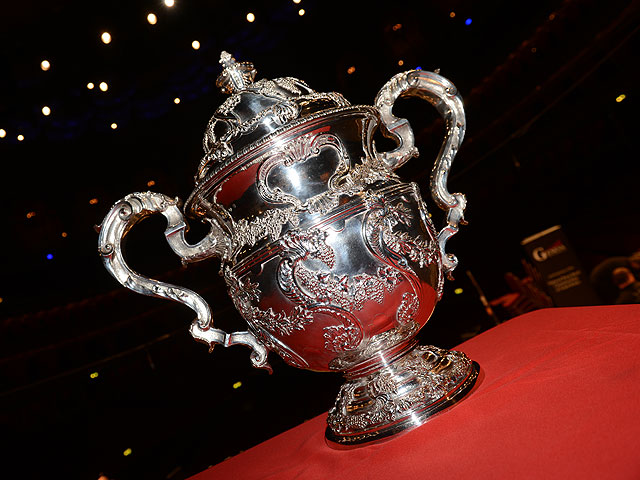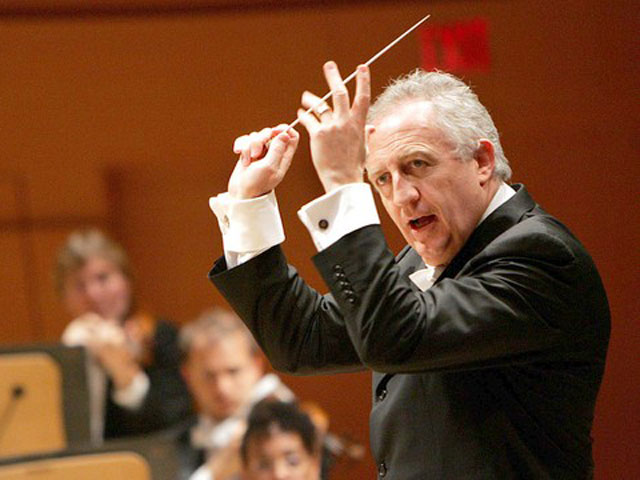
In action...
Chris Thomas: I’d like to chat a little about your thoughts on modern banding in general.
With audiences declining and brass bands by general consent in something of a rut, what do you feel has gone wrong with banding in the eyes of the general public?
Bramwell Tovey: I don’t agree with this prognosis.
I’ve been hearing about this ‘rut’ thing for years and have never believed it. The general public is always astonished when coming up against the best in banding.
When my agent came to hear ‘Requiem for a Charred Skull’ at the RNCM a few years ago, he finally understood his client’s unbridled enthusiasm for the medium.
There may be fewer bands around now than a generation ago, but the general standard is so much higher.
I first conducted Hanwell at the old King’s Hall in Belle Vue at the 1974 British Open.
At that time, instrumental instruction in the school system was in its infancy. Even the mouthpieces and instruments were poor compared to what’s on offer today.
As for the general public, there are issues about attendance at arts events in general which are not just relevant to brass bands but to every aspect of the performing arts.
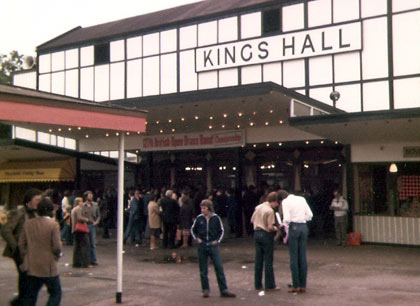
The most famous brass band venue of them all...
Volunteerism in brass bands is so impressive. Whether you’re into banding as a hobby or as an adjunct to teaching or performing professionally, the whole movement is buoyed by volunteers.
The ability to harness and develop volunteer support will be a crucial factor as the movement moves ahead.
As to the general public, the main barrier is the lack of a repertoire with wider appeal.
4,500 people attended the NYWO/NYBBGB BBC Prom last summer, where the NYBBGB played mostly contemporary music.
Being largely an amateur movement there will always be the issue of what the bands want to play as opposed to what the public want to hear.
Some of the younger composers and performers are working in very exciting new areas. Simon Dobson’s kickstarter project looks very interesting, as does Nick Etheridge’s various commissions that are stretching the tuba repertoire, as we saw and heard at the recent NYBBGB course.
What does disappoint is the empty seats at contests, especially when they are sold out.
There is a huge social factor to being involved with brass bands and sometimes the bar looks a more attractive destination than sitting through yet another performance of the same piece.
Chris Thomas: One of your early contest appearances with GUS at the Granada Band of the Year, whilst 'Best of Brass' was still with us at the time too.
Sadly, the days of bands receiving prime time TV coverage seem to be long gone.
Do you see it as a major problem that bands are given such little coverage and are so poorly portrayed by the media in general, or is there a degree of self-inflicted damage evident in this respect?
Bramwell Tovey: Foden’s got a lot of media coverage after winning the ‘Double’ last year.
Much of it was simple public relations of an ephemeral nature. Television is no longer as powerful and prime time is barely definable anymore.
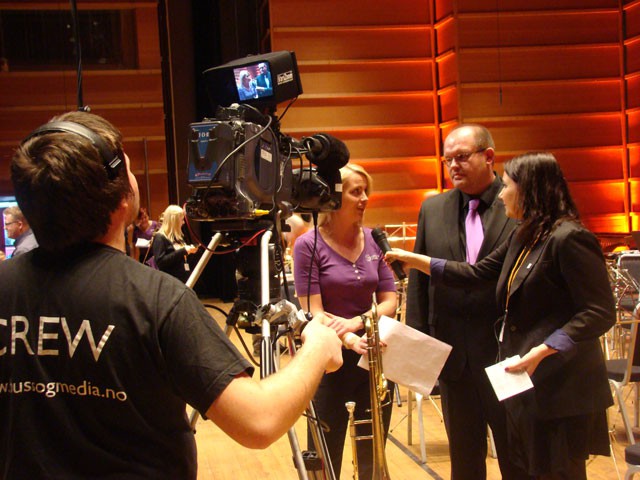
Media coverage has changed
The future is on the web and almost anyone can do a webcast.
I did a live webcast with the Sydney Symphony last year and was amazed at the standard of production. At the VSO we recently recorded CBC’s first webcast production and again, it was mostly very well directed. World of Brass has pioneered DVD recordings.
Forget TV. Anyway, we’d never compete with 'Downton Abbey'.
Chris Thomas: What do you feel can be done to raise the profile of bands within the wider musical world?
Bramwell Tovey: Elgar Howarth and the Grimethorpe Band blazed a trail back in the 1970s and 80s.
They were everywhere, the Southbank, the Proms, every major festival, on television all the time it seemed. I travelled widely to hear them.
One of the main reasons is that many orchestral conductors and composers just don’t want to be involved with brass bands.
Mr Howarth persuaded so many composers to write for bands that there emerged a new respectability.
He persuaded an 18-year-old George Benjamin to write ‘Altitude’, which NYBBGB played at last year’s Prom.
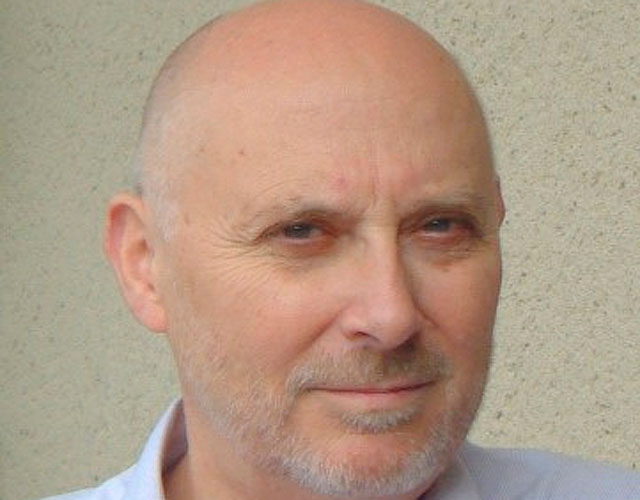
The dazzling Howard Snell
At the same time, Howard Snell began conducting and teaching in earnest and in particular showed how it was possible to make transcriptions that revolutionized the band repertoire with dazzling new scoring possibilities, simultaneously training a new generation of instrumentalists, like Martin Winter to perform them.
Several other conductors did much smaller things, which I guess included me, but no one else managed it like Gary and Howard.
Chris Thomas: The band world has precious few links with the outside musical world these days with the input of musicians such as yourself and Howard Snell being more vital than ever to the profile of banding in general.
Given your brass banding roots, do you feel what might almost be described as a moral responsibility in this respect?
Bramwell Tovey: There may be some moral conscience involved, but I haven’t had to invoke it, as I believe very strongly in brass banding as an art form.
As a musician, I prefer a brass band to a band with blended instrumentation, such as a wind orchestra, for example. Like string orchestras and choirs, brass bands enjoy homogeneity of sound.
I’ve been wondering if the advent of 'El Sistema' might make a difference with the attitude of the musical establishment towards brass bands.
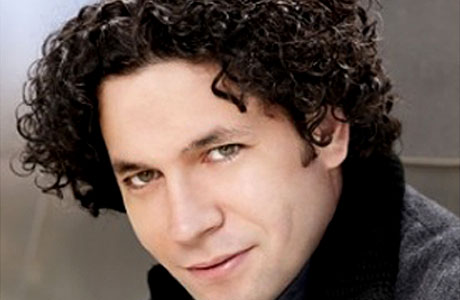
The brilliant Gustavo Dudamel
The Venezuelan system of music education, whose greatest star is the brilliant conductor Gustavo Dudamel, now Music Director of the Los Angeles Philharmonic, has certainly taken the wider musical world by storm.
It seems every major conductor wants to get in on this scene, which is wonderful. PR managers are doing their best to work the Venezuelan angle into their artists’ careers as much as possible. If you have a Venezuelan granny, all the better.
Recently, I approached a well-known conductor with a brass background and invited him to conduct the NYBBGB.
The answer came back that he couldn’t be seen conducting a brass band because of the effect it might have on his career in the orchestral world.
Meantime, there is widespread mania about 'El Sistema'.
So much for social inclusiveness.
Chris Thomas: Much the same can be said for attitudes to new music.
Do you have an opportunity to listen to the music of the numerous composers that have emerged from within the banding fraternity in recent years?
Bramwell Tovey: Yes, and I’m very impressed at the myriad styles and voices that are emerging in the brass band movement.
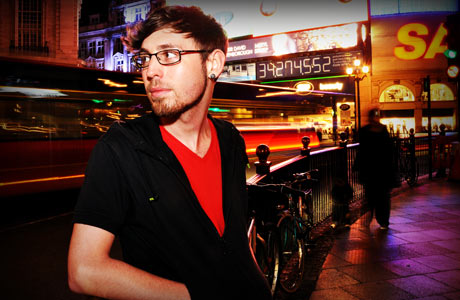
New compositional voices - Gavin Higgins
Simon Dobson is the name I’ve worked with mostly, but Gavin Higgins new work for the NYWO BBC Proms concert last year was incredibly effective. His music has been played at the NYBBGB.
Peter Meechan, who wrote the first commission for NYBBGB in my era and Lucy Pankhurst are two other names I admire.
Young Jonathan Bates in the NYBBGB, is a great young talent who will go far as he stretches his horizons to include the wider musical world.
Chris Thomas: And as an extension of that point, do we need to reach outside the movement and stimulate interest from composers that wouldn’t otherwise write for band?
Is there a real danger that we are missing out on the modern day equivalents of Holst, Elgar, Ireland and Howells by not expanding our horizons?
Bramwell Tovey: Yes, there is a danger of this.
The big contests used to invest in such commissions. However, it is difficult to write and score for brass bands as the transpositions and voicings are very complicated.
They require careful technical preparation before embarking on the composition. Henry Geehl helped even the great Sir Edward Elgar.
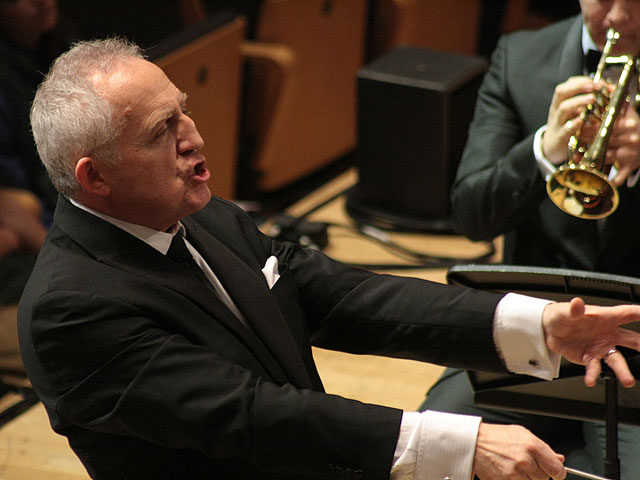
The master providing his own assistance...
Nowadays, Sibelius and Finale systems can provide assistance, but you still have to have the sounds and blends in your head.
I’ve approached and asked several major contemporary composers to write for brass band. I’ve never been turned down, but few have done so yet.
The financial returns are not high and a big prestige orchestral project would always take precedence.
Chris Thomas: I’d like to conclude by talking a little about your recent work in the orchestral world.
In 2008 you won a Grammy award along with violinist James Ehnes for your recording of the Violin Concertos of Walton, Korngold and Barber, all wonderful modern masterworks for the instrument.
That must have been a special moment in your career?
Bramwell Tovey: Jimmy couldn’t go, so my wife and I attended the awards ceremony in Los Angeles.
We heard the nomination read in the traditional way, up against friends and colleagues like Lang Lang and Simon Rattle and orchestras from Berlin, Paris and Moscow.
When the VSO was announced as winners I was thrilled for Jimmy, whom I first heard when he was 13 years old, and for the musicians of the VSO.
The win brought us all real ‘street cred’ and remains a defining moment in the 95-year history of the VSO.
Now, if a brass band could win a Grammy, that would really be something.
It will happen, but not with traditional ideas and concepts.
Chris Thomas: As a conductor, who has been the greatest influence on you from the past and whom do you particularly admire amongst the modern generation?
Bramwell Tovey: Dudamel and Nezet-Seguin are both extraordinary contemporary musicians. Neither is fully developed yet but they are thrilling to hear and observe.
I was very lucky to play for Abbado, Kubelik and Sir Colin Davis amongst others. Klaus Tennestedt was a remarkable conductor, as was Rozhdestvensky whom I once assisted at Covent Garden.
Carlos Kleiber came to conduct Verdi’s 'Otello' at the Royal Opera when I was working there for the Royal Ballet. This remains the greatest operatic experience I’ve had as a listener.
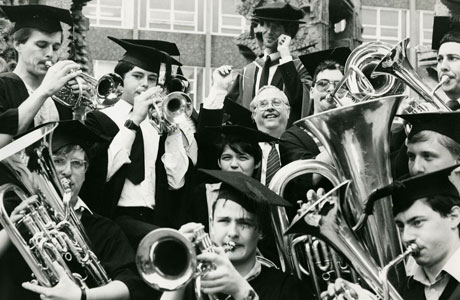
The inspirational Dr Roy Newsome
There are dozens of conductors whose work I enjoy observing and a few from whom it’s possible to learn what not to do.
Several brass band conductors were inspirational, including Geoffrey Brand, Walter Hargreaves, Roy Newsome and Alex Mortimer, all very interesting musicians. Norman Bearcroft and Bernard Adams at the SA were very interesting to play under.
I’m also very inspired by the work being done in original performance practice.
The latest research seems to change almost hourly, but there are some wonderful conductors and musicians working in this field.
Chris Thomas: At present you are Music Director of the Vancouver Symphony Orchestra and you also work closely with orchestras such as the Los Angeles Philharmonic and New York Philharmonic.
Could you tell us a little about your forthcoming activities and what the immediate future holds for you?
Bramwell Tovey: I recently went to Sweden’s Helsingborg Symphony where the programme included ‘Pictures in the Smoke’.
Then it was off to Melbourne (one of my favourite orchestras) before Toronto where I go every year. Then it was back to Vancouver for a Stravinsky festival which included the complete 'Firebird', 'Petrouchka' and the 'Rite of Spring'.
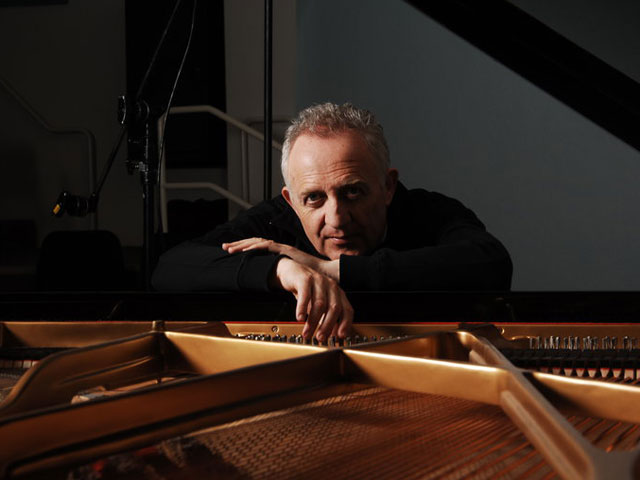
A well earned breather...
Then came Holst’s 'Planets Suite' with the New York Philharmonic before several concerts with the LA Phil at the Hollywood Bowl, two appearances with the Cleveland Orchestra at the Blossom Festival and the Philadelphia Orchestra at the Saratoga Festival.
In October I’m doing several concerts in the UK, including Cadogan Hall with the RPO.
At one of the RPO Cadogan dates I’m doing a concert with RPO brass that’ll include ‘Pictures in the Smoke’.
In July, Joe Alessi played my 'Trombone Concerto' with the New York Phil and in November, Alison Balsom will play my 'Trumpet Concerto' with the LA Phil in Walt Disney Hall.
Sometime this year, once I’ve finished editing it, Naxos will publish the recording of my new opera ‘The Inventor’ which we made in Vancouver last season.
Chris Thomas: What do you consider to be your priorities in planning repertoire for your orchestras?
Bramwell Tovey: We have a computer printout of the last 15 years. This ensures that the core works of the repertoire, Beethoven, Mozart, Haydn, Brahms, Mahler etc are rotated effectively between seasons.
Vancouver is a major destination for all the world’s top artists and we try and feature the very best each season.
Then there are those works that are favourites of the musicians but perhaps less familiar with the public or require special occasions to make possible.
For example, for the 2010 Vancouver Winter Olympics, Cultural Olympiad we mounted Mahler’s 8th, ‘Symphony of a Thousand’ with singers from across Canada.
Repertoire selections are very important when the VSO goes on tour. We’ve just completed a tour of Western USA, our third trip in four years.
We played 'Prokoviev 5', 11 times in two weeks - quite the workout.
Chris Thomas: I’ve noticed that several of your recent concerts feature contemporary music including Harrison Birtwistle and Michael Finnissy amongst others.
Do you feel a strong commitment to introducing new music to your audiences?
Bramwell Tovey: Well, the two composers you mention have been around such a long time they are really not so ‘contemporary’ anymore.
We have a new music series in the Orpheum Annex, a new hall next to our home in downtown Vancouver and an international new music festival that welcomes Brett Dean as our visiting composer-in-residence next January.
Plus, of course, there’s new music in many of our subscription concerts. This is mostly curated by our composer-in-residence, the Dutch/Canadian Edward Top.
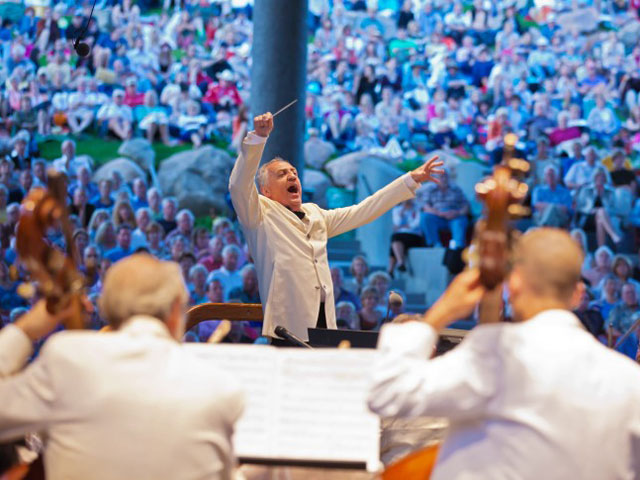
Action packed audience pleaser...
In Winnipeg, the New Music Festival that started in my second year as music director, has been around for nearly a quarter of a century.
Since 1992, I’ve worked with a composer-in-residence with each of my Canadian orchestras. Since 1997 I’ve also worked with an assistant conductor on staff, working mostly as an apprentice.
Composers hold a mirror up to our own times. In the 21st century, music has finally come of age.
We are no longer dictated to by a patriarchy, as in the 60s and 70s, an elitist avant-garde. Thankfully, we can now embrace all kinds of diversity and even write music in a plurality of styles.
This is a very exciting time to be a composer and the best I can remember for being a listener.
Chris Thomas: Your charisma and all round persona on the podium have proved hugely popular with your audiences.
Have you consciously tried to break down what is still seen by some as the aura of stuffiness that pervades classical concerts?
Bramwell Tovey: No. I’ve just tried to be an honest broker, as good a musician as I can be and as unpretentious as possible while never letting go of the pursuit of excellence.
I flunk this every day. It’s awful.
Chris Thomas: And one final question!
Can you still see yourself continuing to work with brass bands in the future, as you have done throughout your career to date?
Bramwell Tovey: No plans to stop.
I’d still like to win the National in memory of my parents who adored ‘The Contest’ each year.
My personal loyalties are with Foden's who have continued to invite me despite my abysmal attendance record.
The one that got away...?
With Allan Withington so successful that opportunity has receded. I should have made myself available when the chance was there.
As for the NYBBGB, this has become one of the central pillars of my musical life.
It’s almost impossible to explain, but really, they are family.
Even though I’ve worked very hard for it, I’ve been a very lucky man. I had no idea all this was going to happen to me when I started up on 2nd baritone.
I had no idea you could get here from there.
4BR Bramwell Tovey Interview (Part 1): http://www.4barsrest.com/articles/2013/1397.asp#.UhD8uZJOR8F
4BR Bramwell Tovey Interview (Part 2): http://www.4barsrest.com/articles/2013/1404.asp#.UhD8g5JOR8E
For more information visit: www.bramwelltovey.com



